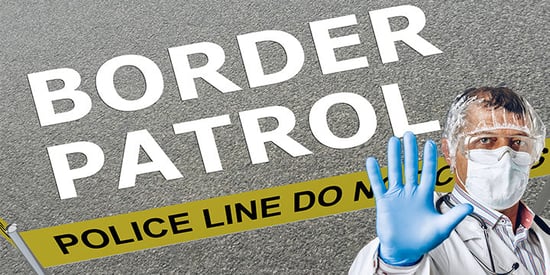Global supply chain disruptions caused by the COVID pandemic led to bad actors in markets, as well as bad decisions by historically good actors. Despite the cleanroom glove segment being less than 2% of the overall glove market, the result was US import bans on nationally recognized critical environment glove brands.
Table of Contents
- How did this lead to import bans for unethical labor practices?
- But “we buy from national suppliers so we’re not worried.” Are you sure?
- What should you do to avoid import ban disruptions?
The story begins with unqualified manufacturers jumping in.
New players entered the market in the form of unqualified glove makers who sought quick profits by producing – intentionally or not – poor quality gloves. Customer reports and product inspections by US Customs and Border Protection revealed product variability and inconsistency from pinholes to glove thickness and color. These inconsistent quality gloves introduced a contaminant risk, but that’s not the whole story.
How did this lead to import bans for unethical labor practices?
Quality variability led US Customs authorities to investigate these glove manufacturers further. These investigations uncovered inhumane labor practices including forced labor. CBP banned products from five disposable glove manufacturers in Malaysia from entering the US. Since Malaysian factories produce 70% of the world’s nitrile gloves, the bans negatively impacted the entire nitrile glove market, including the critical, controlled environment segment.
But “we buy from national suppliers so we’re not worried.” Are you sure?
The story continues with well-intentioned importers not doing their due diligence. This can happen when a reputable glove supplier fails to perform on-site audits and inspect their contract providers. Through this omission, they put their supply chain at risk of contamination from non-compliant gloves, threaten production because of disrupted glove inventory, and damage reputations by any association with unethical labor practices.
Inset/Call out/Sidebar: What we mean by “supplier”: Your organization may procure and receive your products through a distribution channel. Distributors are valuable logistics, inventory, and service partners; however, the product manufacturer is responsible for product quality, compliance with published specifications, and compliance with how the product is made, including labor and environmental standards. In this article, “supplier” is the entity where you order your products. If your supplier is a distributor, they need to provide the manufacturer’s information to you. If that is not available, you should look for a more transparent distributor that prioritizes your needs. If you order manufacturer direct, ask your manufacturer for this information.
What should you do to avoid import ban disruptions?
Add these three questions along with your cleanliness and comfort requirements when qualifying gloves and other critical consumables:
Q1: What mandatory (legislative) labor practices and publicly available, voluntary ethical labor standards apply to the manufacturer, and will they provide annual certification of ethical labor practices compliance?
What to expect: The manufacturer should promptly reply with their government’s applicable fair labor, health, and safety regulations. Best-in-class manufacturers today participate in voluntary fair trade and labor programs, such as Sedex. If your company’s CSR (Corporate Social Responsibility) department has a questionnaire, your manufacturer should complete it promptly – and you should ask for this at least annually.

Q2: What action does your supplier take if the country of origin for a product, raw material formulation, or manufacturing process is different than before, even if it has the same part number?
What to expect: If a product was banned, the manufacturer should provide documentation of corrective action and when the ban was removed.
Finally, business continuity plans depend on redundancy. Without a qualified secondary manufacturer for critical cleanroom consumables (gloves, wipers), your business is at risk. Allocating a percentage of your business annually to the secondary supplier will ensure they’re there when you need them.
Q3: Has the product been subject to a US import ban in the past five years, and if yes, what was their corrective action?
What to expect: If a product was banned, the manufacturer should provide documentation of corrective action and when the ban was removed.
Finally, business continuity plans depend on redundancy. Without a qualified secondary manufacturer for critical cleanroom consumables (gloves, wipers), your business is at risk. Allocating a percentage of your business annually to the secondary supplier will ensure they’re there when you need them.
Additional References and Resources:
CBP Seizing Cleanroom Glove Imports
CBP Issues Withhold Release Order on Supermax Corporation Bhd. and its Subsidiaries
Nov. 2021: CBP Issues Withhold Release Order on Malaysian Glove Producers
Lookup US Customs and Border Protection WROs (detentions)
Sedex programs for responsible business and sourcing
Cover Image by vectorjuice & Image 2 by johnstocker on Freepik

Valutek
Valutek is one of the first and few manufacturers to offer a full product portfolio of best-in-class cleanroom products. Since 1988, our controlled environment consumables are helping leading organizations operate their cleanrooms in a consistently stable state.
Related Articles
- Greg Heiland
.jpg?width=80&height=80&name=IMG_1600%20(2).jpg)
- 13 January 2022
U.S. Customs and Border Protection Seizing Cleanroom Glove Imports
Effective December 20, U.S. Customs and Border Protection (CBP)announcedthey will ban imports of...
- Valutek

- 28 March 2023
3 Questions To Qualify Your Cleanroom Glove Supplier
Cleanroom gloves are supposed to be contaminant free. But not all gloves meet that requirement –...
- Valutek

- 27 December 2023
Glove Liners: Improving More Than Operator Comfort
Operators in your controlled environment know it—cleanroom gloves can be uncomfortable, reduce...


